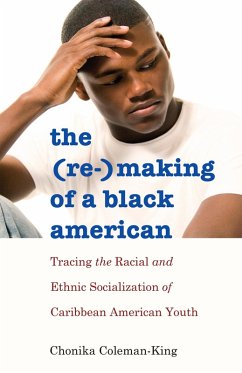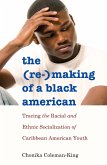Historically, Blacks in the United States have been treated as a homogenous group with little regard for distinctions in ethnicity and immigrant status. However, the growing number of Black immigrants to the United States, and their location at the intersection of immigrant opportunity and racial barriers, has prompted increased interest in the group's integration experiences. Grounded in the notion that racism is an inescapable marker of the Black experience in the United States, The (Re-)Making of a Black American explores the ways children of Black immigrants from the English-speaking Caribbean come to understand their racial and ethnic identities, given the socialization messages they receive from their parents and their experiences with institutionalized racism and racial hierarchies in a U.S. middle school. This book highlights the contradictions between parental and school socialization messages and the struggle that ensues as Caribbean American youth are forcibly (re-)made into a specific brand of Black Americans.
Dieser Download kann aus rechtlichen Gründen nur mit Rechnungsadresse in A, D ausgeliefert werden.
«In this important new book, Chonika Coleman-King probes the complex challenges confronting immigrant children from the English-speaking Caribbean as they navigate school and undergo transformations to their national and racial identities. In contrast to earlier studies that have offered broad generalizations about Caribbean immigrants, this book provides a detailed and nuanced analysis on the experience of these students as they strive for academic success while negotiating the reality of race in America. Clear, insightful, and well-documented, this book is an important contribution to the field of education and to existing research on immigrants.» (Pedro Noguera, Peter L. Agnew Professor of Education, New York University)
«America's Black population, like the rest of American society, is being profoundly impacted by immigration. What it means to be Black, always complex but taken for granted, is becoming even more complex as immigrants force consideration of ethnicity alongside monolithic notions of race. In The (Re-)Making of a Black American, Chonika Coleman-King demonstrates, excellently, how these dynamics play out in the school system and their implications for American society as a whole.» (Milton Vickerman, Department of Sociology, University of Virginia)
«America's Black population, like the rest of American society, is being profoundly impacted by immigration. What it means to be Black, always complex but taken for granted, is becoming even more complex as immigrants force consideration of ethnicity alongside monolithic notions of race. In The (Re-)Making of a Black American, Chonika Coleman-King demonstrates, excellently, how these dynamics play out in the school system and their implications for American society as a whole.» (Milton Vickerman, Department of Sociology, University of Virginia)









